The regulator had ordered the Cambridge Islamic College to change its name because it was too similar to the nearby Cambridge Muslim College
The charity tribunal has ruled that an Islamic college does not need to change its name, overturning an order issued by the Charity Commission last year.
The tribunal’s decision, which was published this week after a hearing was held last month, said that Cambridge Islamic College should not have to change its name despite a section 42 order issued by the commission.
The Charity Commission had ordered the name change in September last year because of similarities with the existing Cambridge Muslim College, which made a formal complaint to the commission in June 2016.
But the tribunal ruled that the regulator’s order “gave inadequate consideration to a number of important factors” and should be quashed.
It is the first time the tribunal has overturned a Charity Commission order since June 2015.
The Charity Commission said it had concerns about the tribunal’s judgment and was considering an appeal.
The tribunal ruling said the commission ordered Cambridge Islamic College to change its name because it was similar enough to Cambridge Muslim College to give the impression that they were connected, when they were in fact separate organisations.
The commission had also concluded there was evidence of people confusing the two charities, and a likelihood of further confusion and potential financial loss to Cambridge Muslim College if Cambridge Islamic College retained its existing name, the commission decided.
Cambridge Islamic College then appealed the decision to the charity tribunal, although an internal review by the commission concluded in December that the name-change order should stand.
Cambridge Islamic College argued during the tribunal hearing that the words “Islamic” and “Muslim” were both distinct words with different meanings – which differed from the Charity Commission’s ruling that the words were interchangeable – and that the two charities’ objects were sufficiently different.
The tribunal also heard that Cambridge Islamic College feared financial losses would occur after the name change took place.
The tribunal specifically said the regulator’s order did not provide any evidence to back its claim that the words “Islamic” and “Muslim” were interchangeable, and questioned the regulator’s claim that general confusion about the two charities fulfilled a legal test of whether a charity was giving an impression of a relationship to another.
The commission’s original decision also failed to consider the financial impact on Cambridge Islamic College of the name change, the tribunal ruled, and the regulator did not properly carry out a two-stage test as part of the name-change order.
Chris Willis Pickup, head of litigation at the Charity Commission, said: “We have some concerns about the tribunal’s approach to the legal framework for our name-change power, particularly that its narrow interpretation of the legal tests might prevent the commission from acting where there is a genuine issue with a charity’s name.
“We are therefore considering whether to appeal this decision to the upper tribunal to clarify the legal framework.”
